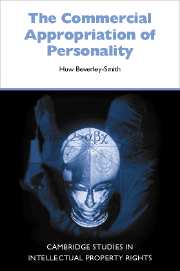Book contents
- Frontmatter
- Contents
- Preface
- Table of cases
- Table of statutes
- Part I A framework
- Part II Economic interests and the law of unfair competition
- Part III Dignitary interests
- 6 Introduction
- 7 Privacy and publicity in the United States
- 8 Privacy interests in English law
- 9 Interests in reputation
- Part IV Pervasive problems
- Part V Conclusions
- Bibliography
- Index
- Cambridge Studies in Intellectual Property
6 - Introduction
Published online by Cambridge University Press: 07 July 2009
- Frontmatter
- Contents
- Preface
- Table of cases
- Table of statutes
- Part I A framework
- Part II Economic interests and the law of unfair competition
- Part III Dignitary interests
- 6 Introduction
- 7 Privacy and publicity in the United States
- 8 Privacy interests in English law
- 9 Interests in reputation
- Part IV Pervasive problems
- Part V Conclusions
- Bibliography
- Index
- Cambridge Studies in Intellectual Property
Summary
Systems rooted in English common law have traditionally given limited recognition to ‘dignitary interests’, used here as a generic term for the essentially non-pecuniary interests that a person might have in his own personality: reputation, personal privacy and freedom from mental distress. English law knows no concept similar to the Roman law injuria, which, in English, would mean insult or outrage, though neither word suggests the true nature of the Roman idea which ‘embraced any contumelious disregard of another's rights or personality’. The essence of the delict lay in the insult rather than the loss to the plaintiff, and the money compensation represented solace for injured feelings or affronted dignity rather than compensation in the ordinary sense; thus the primary purpose of the action was to punish the defendant by the infliction of a pecuniary penalty.
Although by the early twelfth century wrongs were widely identified in England by reference to two separate components, economic loss (damnum) and affront to personal honour (dedecus), the notion of injuria, or affront to honour, disappeared as an operative element in English tortious liability and was completely eclipsed by the element of economic loss. By the time that the common law permitted actions on the case for defamatory words in the sixteenth century, due in part to the deficiencies of the remedies available in the Church courts, the notion of injuria had been lost from the English common law.
- Type
- Chapter
- Information
- The Commercial Appropriation of Personality , pp. 141 - 144Publisher: Cambridge University PressPrint publication year: 2002



